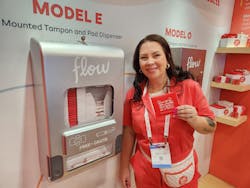3 Smart Solutions for Free Menstrual Care (ISSA 2023)
Is your facility still relying on the old, outdated period product dispensers that require a quarter to dispense an item? In a growing number of locations, that could present a problem.
Many states are now mandating access to free period products in schools, and Canada recently introduced a similar requirement for federally regulated workplaces. Organizations that need to comply with these regulations—or get ahead of similar regulations that could come to other locations—can no longer rely on the old dispensers.
Fortunately, innovative manufacturers are stepping in with solutions.
These three free product dispensers, spotted at the 2023 ISSA Show North America, ensure dignity and privacy for anyone who uses them—and all three are a low-maintenance, low-hassle solution for facilities teams.
Aunt Flow: Freely Accessible Products with an Innovative Dispenser
“Our whole thought process is: Toilet paper is offered for free, so why aren’t period products?” asked Jen Lyttle, vice president of sales for Aunt Flow.
Free-vend dispensers like Aunt Flow’s could present a solution for these facilities.
“Period poverty is a real thing,” Lyttle said. “A lot of people don’t have access to products or the means to buy products. Think about when you go to the restroom and start your period—a lot of people are not carrying quarters for the machines, or they’re not offered at all. We offer products freely accessible so you’re not having to charge for them, and if you’re in need in an urgent situation, it’s offered to you at no cost.”
The company has deployed 38,000 machines across the U.S., Canada and the UK. The dispensers feature a clear view window on the front so your custodial teams can tell at a glance which dispensers need to be restocked. The dispensers hold 100 products each—many other models hold 30-50—and have universal keys so that staff members only need to carry one key to open all of the Aunt Flow dispensers.
Egal: Pads on a Roll
Egal’s innovative solution places a roll of 40 individually wrapped pads next to the toilet paper dispenser, ready for anyone in need. The roll design cuts down on waste significantly compared to traditional vending machines that dispense pads in boxes, explained Tom Devlin, Egal’s founder and CTO.
“It’s there when you need it. No one wants to get up and find out the vending machine doesn’t work,” Devlin said. “A vended solution also requires a box for each pad, and that box adds a significant amount of material. For every million pads made, we save 8.5 tons of material because we don’t have that packaging.”
The rolls are easy for maintenance teams to restock, and the dispensers feature signage encouraging users to take one and urging them not to flush period products.
“It’s low maintenance, low relative cost and high payback for your employees because you’re showing goodwill and taking care of them,” Devlin said. “It’s an inexpensive way to show you care for your employees.”
MaskIT: Disposal Products That Protect Your Facilities Staff
Public restrooms may be the only area in a typical commercial building where blood isn’t handled with appropriate precautions, noted Shallan Ramsey, inventor, founder and CEO of MaskIT. MaskIT aims to address that lack of caution with single-use, plant-based disposal bags that provide glove-like coverage for people removing a menstrual item. The bags then turn inside out to contain the item and seal shut permanently. Made of a potato-based biofilm, the bags also block odor on a molecular level.
“By eliminating contact with blood during the removal process, we’re able to address touchpoint contamination in the restroom,” Ramsey explained. “Having everything sealed and contained will protect custodial staff and anyone else who has to use that restroom.”
Facilities that implement MaskIT have seen a reduction in plumbing issues because people aren’t flushing menstrual products as often, Ramsey added. The dispensers, which hold 50 large bags for pads and 50 smaller bags for tampons, are used in 70 airports across the U.S., as well as Fortune 500 companies and several colleges and universities.
About the Author
Janelle Penny
Editor-in-Chief at BUILDINGS
Janelle Penny has been with BUILDINGS since 2010. She is a two-time FOLIO: Eddie award winner who aims to deliver practical, actionable content for building owners and facilities professionals.

